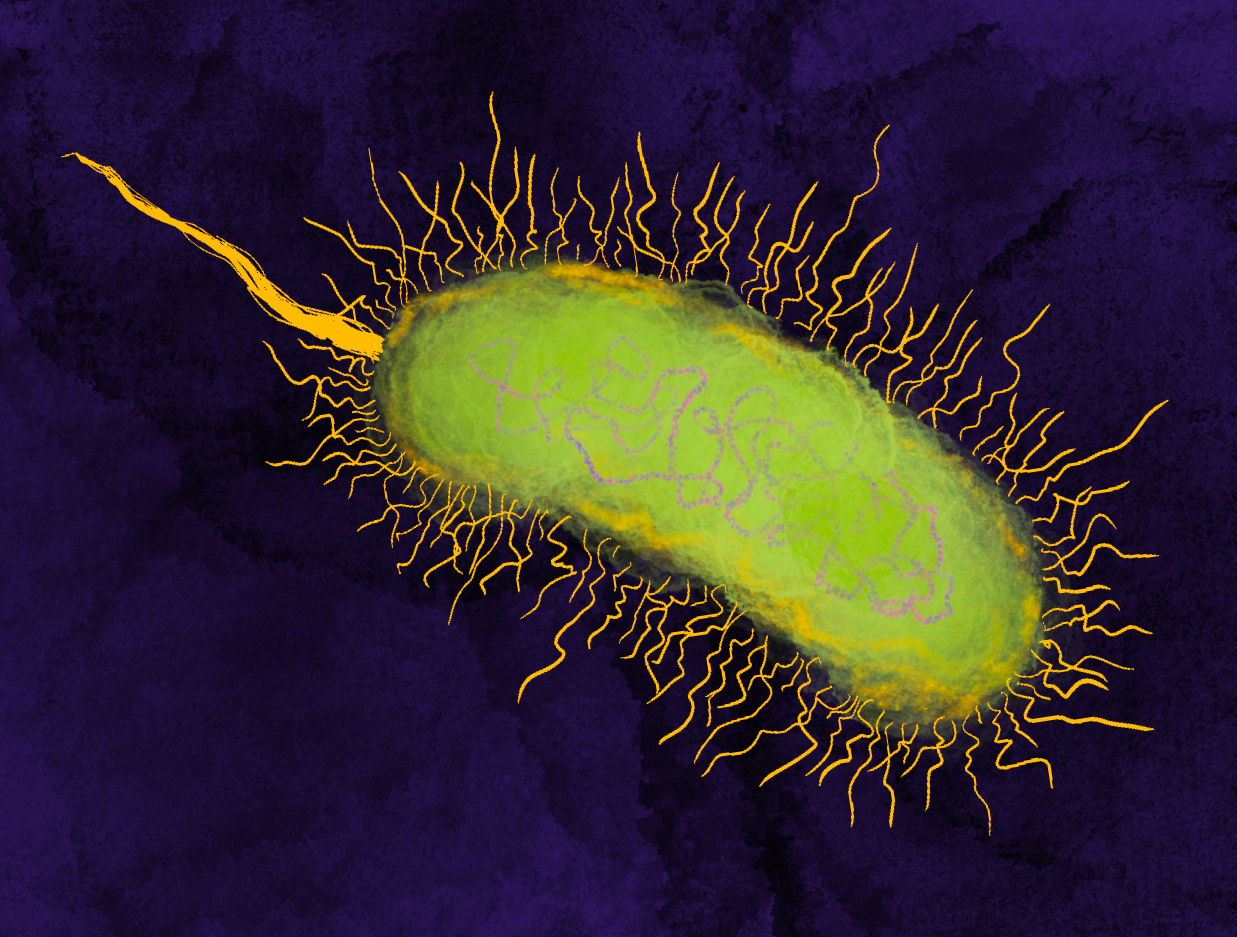As of Nov. 18 12:00 PM CST, 94 lab-confirmed or suspected cases of E. coli have been found in an investigation being conducted by the St. Louis County Department of Public Health (DPH). More than half of these cases have been tied to events held by Rockwood Summit communities and clubs, according to the DPH. In an article published Nov. 14 by Lucas Sellem and Russell Kinsaul of KMOV, the DPH confirmed they were investigating possible sources of the outbreak including interactions with food, traveling, whereabouts, exposure to animals, etc. In a later statement published Nov. 18 by 5 On Your Side, the DPH made connections between the outbreak and four separate events “hosted at or catered through Andre’s Banquets and Catering” affiliated with Summit. Officials from the DPH stated that current details gathered from the investigation are pointing toward the salad served at the events being a main source of the bacteria.
John Armengol Jr., the owner of Andre’s Banquets and Catering, denied any fault.
“We order everything through [Hazard Analysis Critical Control Point] and all of our food is [United States Department of Agriculture] certified.”
The Andre’s owner said the business willingly gave a sample to the DPH for E. coli testing on Monday Nov. 18. According to Armengol, the lettuce under investigation goes to many other local restaurants which have not reportedly had issues.
“We gave a sample of the lettuce [that was served at the events] to the Health Department [on Nov. 18] that they are going to test. We’re also going to be doing our own independent testing. The same lettuce that Andre’s uses goes to [other] restaurants in town. Syberg’s, the Ritz Carlton, Applebee’s, Circle Seven Ranch, Maggie O’ Brien’s, we all use the same iceberg romaine blend with no issues.”
The results of the tests are expected to return with a verdict on Thursday, Nov. 21.
Armengol reported that the caterer served nearly 8,000 customers in the past two weeks. He claims that there have been no incidents.
“The week of Nov. 9 that’s in question, we [served] 3,440 people with no issues. Then this past week, we [served] 4,400 people with no issues.”
One community event with ties to the E. coli outbreak is the Veterans Day assembly and luncheon held on campus during the school day on Nov. 8. Many veteran family members of students and staff attended the event with a ceremony and a catered lunch of pastas and salad. The catering for the event was served by Andre’s.
“We came up [to Summit’s campus] to do catering on Nov. 8 at the school. We were instructed by a teacher at the school- normally we serve the food- that students there were going to serve Andre’s food and then take it to the tables for the [veterans]. We provided gloves for the students that were serving the food and putting it on plates but we didn’t have extra gloves because I didn’t know 40 people were going to be involved with serving the event. The cheerleaders went ahead without gloves and served the food to the guests.”
The business has been greatly affected by the controversy, noting that they have experienced cancellations. The owner plans to stick to his claim that Andre’s is not at fault and stated that the business will take action against parties who made accounts against them.
“When Rockwood Summit put my name out there along with the Health Department, we’ve had multiple cancellations. It was reckless without any proof, defamatory. And we will defend ourselves fully that we are 100% innocent in this whole situation. Anybody who defamed us will be dealt with individually.”
Armengol said he expects justice and an apology from the school district when the results of the E. coli test on the lettuce sample comes back.
“I’ll have all the results, they’ll come back negative and then the whole school district is going to have a lot of questions to answer. When they show nothing, all of these claims from the school pointing the finger at Andre’s will be null and void and an apology will be awaiting.”
Rockwood sent a message to Summit staff, students and families the morning of Nov. 15 sharing a survey from the DPH requesting information from “anyone who attended a catered event or consumed food served from a banquet/catering facility from 11/4/24 through 11/11/24.” Head principal Dr. Emily McCown said the school is doing their part to report cases as they emerge.
“We’re sharing any information we have with the Department of Public Health as we get any names of students that might be exhibiting symptoms or have a confirmed case so they can do their part investigating the possible source,” McCown said.
According to Sellem and Kinsaul, the DPH detailed common symptoms to look out for and a recommendation to avoid using antibiotics when treating the bacteria’s symptoms.
“DPH says symptoms usually begin 2 to 5 days after exposure and can last 5 to 10 days. The most common E. coli O157 infection symptoms include severe diarrhea (often bloody) and painful abdominal cramps. According to DPH, antibiotics should not be used to treat an E. coli 0157 infection.”
According to John Hopkins Medicine, E. coli is one of many bacteria regularly found in the intestines. It controls the balance of normal and harmful bacteria in the stomach. However, different stands of the bacteria can have different attributes. The particular strand affecting the Summit community is the most common to cause illness in humans by damaging the lining of the intestines.
The school was thoroughly disinfected to prevent further spread of the bacteria, according to McCown.
“[Wednesday night, Nov. 13] we did a disinfecting of all common spaces. Classrooms were sprayed with disinfectant, the Commons was sprayed, door knobs were wiped down, and handrails were wiped down. That was really just an extra safeguard for possible spread,” McCown said.
The families who were present at one event being investigated have been contacted through StudentSquare with the steps they can take after possible exposure, McCown said.
“The group that seemed to have commonality was sent some specific information about symptoms to look out for. We also shared some information that they could share with their pediatrician or the Department of Health to contact if they had a concern.”
School nurse Colleen Jackson said the message was sent to families who attended an end-of-season event outside of the Summit campus.
“The school district sent out a message to all the students and families who attended the band banquet last week [on Nov. 7]. Those parents should have received information about a cluster of E. coli cases that the health department reported to them. They sent the information to band parents so they could monitor their children and the attendees of the banquet for symptoms,” Jackson said.
The nurse’s office is reportedly taking extra precautionary measures to keep students and staff safe.
“We’re doing typical infection control prevention such as washing hands, wiping down cots like we normally do between students, and having the custodians clean and spray the bathrooms if we know of someone using it who has symptoms,” Jackson said.
Although McCown said she cannot give details to where the spreading event took place as of Nov. 14, she said the students ingested a common food source.
“I can’t confirm any source of the spread. We know there was an outside organization that had an end-of-season event. All I can say is that we have some clusters of students that have had a common food source, that’s what we’ve shared with the Department of Health,” McCown said.
The lunches and breakfast provided to students at school are not a possible source of the infection, according to McCown.
“In terms of [Summit’s] larger population, right now it does not seem to be spreading to friend groups or through common contact. This particular strand tends to be a foodborne illness. What we’re seeing right now is the spread being contained to that. I’ve confirmed with others that [school meals] do not seem to be a commonality,” McCown said.
Jackson gave advice to concerned parents and students to maintain regular hygiene and speak to their doctor for more information.
“If [students or staff] develop symptoms, particularly if they were at the band event, they should contact their physician and follow the guidelines they receive. My concern for students in the building right now is to make sure they’re washing their hands well before eating, any time they’re using the bathroom, or any other time,” Jackson said.
The owner of the banquet hall did not comment on the possibility that the food served at the band event was a possible contaminant.
The parent of one sick student, Michele Dubrouillet, said she attended an off-campus event under investigation on Nov. 7 with her son and other community members. Dubrouillet said she has received support from other families that were at the event.
“I attended the banquet with my son, Nolan and I met some friends there to sit with. I’ve been in contact with several band families seeing how the kids are. I asked one family about the best hospital since the mom is a nurse. The kids have been texting each other, too, comparing symptoms. [I’ve been] checking his temperature, seeing how often he was having diarrhea, and having him sip water to avoid dehydration,” Dubrouillet said.
Concern for the health of her child has resulted in mounting stress for Dubrouillet.
“I was just concerned that so many kids were getting sick and my own kid as well. He has never been this sick before. I’ve had to miss work. We’ve had to contact the pediatrician twice, and ultimately had to go to the E.R. Nolan spends more time in the bathroom than anywhere else. It’s been a lot.”
As a piece of advice to other families fighting off the infection, Dubrouillet said to deal with symptoms as they arise, rather than worrying about the future.
“Be careful of dehydration. Drink Gatorade but not the red flavor because it could be confused with bloody feces. Take it one day at a time,” Dubrouillet said. “I just want everyone to feel better. I don’t want anyone else to have to go through this.”
Many communities and school-sponsored clubs have been impacted by the spread of the bacteria. The outbreak has caused absences in classes, rehearsals, and meetings. The fall play, Puffs, is one of many clubs affected. Stage manager Finnley Free said one of the main characters in the production has contracted the illness, preventing them from performing on show nights.
“One of our lead actors got sick from the band banquet at Andre’s and has E. coli. As a stage manager, I have to step up and perform the role until they are better, which is probably for the foreseeable future. I’ll be going on stage with a script but it’s still very stressful. I’m taking on a double-role as both an actor and stage manager. That’s kind of my job, to step in if anybody is not able to perform for any reason,” Free said.
Free said the bacteria has thrown a wrench into the production plans but the participating students are persevering by assuming new leadership roles.
“My initial thought [when I heard about the outbreak] was ‘what do we do now?’ I was nervous, to say the least. There are a lot of band kids that are also in theater. We’re actually missing a lot more technicians, not just actors. I think we have two or three that are out with E. coli right now. Initially I also felt sad because I couldn’t imagine working so hard on something for three months and then you don’t get to perform. It’s kind of scary,” Free said.
The outbreak has caused anxiety for many Summit students, including those involved in the fall play. Free said students have been supporting each other in these uncertain times.
“We’ve been discussing it with each other and sending our condolences. A lot of [the affected people] are in the hospital right now which is scary. Some people might have to take on an extra role tonight but that’s just how it’s going to be. We all have to work together and stay calm,” Free said.
Fears about contracting the bacteria are unsettling students, Free said.
“I myself went to the banquet and I ate the salad which we think is the main culprit of the outbreak. I’m scared because, what if I get it? What would they do? We have a lot of people that are nervous, there are other actors, there are other technicians who are very crucial to how the show is going to run. If they are out in the hospital we don’t know if we could do the show.”
For any community members with health concerns about the outbreak, McCown offered advice to seek care from your doctor.
“If you have any concerns about any symptoms that your kids are experiencing, make sure you contact your pediatrician or your healthcare provider. For the population at large, continue to make sure you’re washing your hands and using a good sense of hygiene as you do during any cold and flu season,” McCown said.
Live updates will be given on this page as more information becomes available.







Rebecca Corkery • Nov 16, 2024 at 10:12 am
Great story. Very informative. Sorry your school community is going through this.